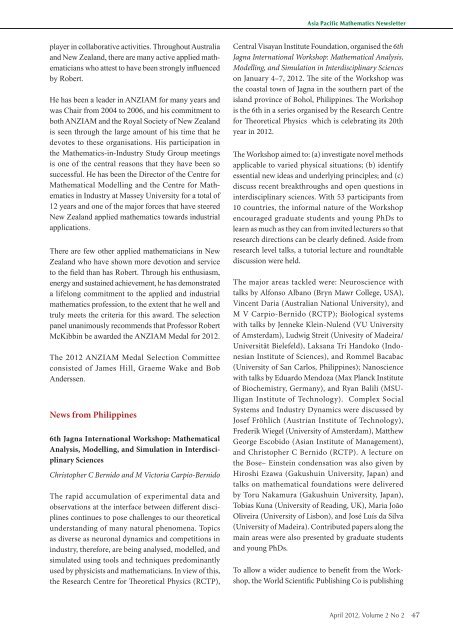Mathematics Newsletter
Mathematics Newsletter
Mathematics Newsletter
Create successful ePaper yourself
Turn your PDF publications into a flip-book with our unique Google optimized e-Paper software.
player in collaborative activities. Throughout Australia<br />
and New Zealand, there are many active applied mathematicians<br />
who attest to have been strongly influenced<br />
by Robert.<br />
He has been a leader in ANZIAM for many years and<br />
was Chair from 2004 to 2006, and his commitment to<br />
both ANZIAM and the Royal Society of New Zealand<br />
is seen through the large amount of his time that he<br />
devotes to these organisations. His participation in<br />
the <strong>Mathematics</strong>-in-Industry Study Group meetings<br />
is one of the central reasons that they have been so<br />
successful. He has been the Director of the Centre for<br />
Mathematical Modelling and the Centre for <strong>Mathematics</strong><br />
in Industry at Massey University for a total of<br />
12 years and one of the major forces that have steered<br />
New Zealand applied mathematics towards industrial<br />
applications.<br />
There are few other applied mathematicians in New<br />
Zealand who have shown more devotion and service<br />
to the field than has Robert. Through his enthusiasm,<br />
energy and sustained achievement, he has demonstrated<br />
a lifelong commitment to the applied and industrial<br />
mathematics profession, to the extent that he well and<br />
truly meets the criteria for this award. The selection<br />
panel unanimously recommends that Professor Robert<br />
McKibbin be awarded the ANZIAM Medal for 2012.<br />
The 2012 ANZIAM Medal Selection Committee<br />
consisted of James Hill, Graeme Wake and Bob<br />
Anderssen.<br />
News from Philippines<br />
6th Jagna International Workshop: Mathematical<br />
Analysis, Modelling, and Simulation in Interdisciplinary<br />
Sciences<br />
Christopher C Bernido and M Victoria Carpio-Bernido<br />
The rapid accumulation of experimental data and<br />
observations at the interface between different disciplines<br />
continues to pose challenges to our theoretical<br />
understanding of many natural phenomena. Topics<br />
as diverse as neuronal dynamics and competitions in<br />
industry, therefore, are being analysed, modelled, and<br />
simulated using tools and techniques predominantly<br />
used by physicists and mathematicians. In view of this,<br />
the Research Centre for Theoretical Physics (RCTP),<br />
Asia Pacific <strong>Mathematics</strong> <strong>Newsletter</strong><br />
Central Visayan Institute Foundation, organised the 6th<br />
Jagna International Workshop: Mathematical Analysis,<br />
Modelling, and Simulation in Interdisciplinary Sciences<br />
on January 4–7, 2012. The site of the Workshop was<br />
the coastal town of Jagna in the southern part of the<br />
island province of Bohol, Philippines. The Workshop<br />
is the 6th in a series organised by the Research Centre<br />
for Theoretical Physics which is celebrating its 20th<br />
year in 2012.<br />
The Workshop aimed to: (a) investigate novel methods<br />
applicable to varied physical situations; (b) identify<br />
essential new ideas and underlying principles; and (c)<br />
discuss recent breakthroughs and open questions in<br />
interdisciplinary sciences. With 53 participants from<br />
10 countries, the informal nature of the Workshop<br />
encouraged graduate students and young PhDs to<br />
learn as much as they can from invited lecturers so that<br />
research directions can be clearly defined. Aside from<br />
research level talks, a tutorial lecture and roundtable<br />
discussion were held.<br />
The major areas tackled were: Neuroscience with<br />
talks by Alfonso Albano (Bryn Mawr College, USA),<br />
Vincent Daria (Australian National University), and<br />
M V Carpio-Bernido (RCTP); Biological systems<br />
with talks by Jenneke Klein-Nulend (VU University<br />
of Amsterdam), Ludwig Streit (Univesity of Madeira/<br />
Universität Bielefeld), Laksana Tri Handoko (Indonesian<br />
Institute of Sciences), and Rommel Bacabac<br />
(University of San Carlos, Philippines); Nanoscience<br />
with talks by Eduardo Mendoza (Max Planck Institute<br />
of Biochemistry, Germany), and Ryan Balili (MSU-<br />
Iligan Institute of Technology). Complex Social<br />
Systems and Industry Dynamics were discussed by<br />
Josef Fröhlich (Austrian Institute of Technology),<br />
Frederik Wiegel (University of Amsterdam), Matthew<br />
George Escobido (Asian Institute of Management),<br />
and Christopher C Bernido (RCTP). A lecture on<br />
the Bose– Einstein condensation was also given by<br />
Hiroshi Ezawa (Gakushuin University, Japan) and<br />
talks on mathematical foundations were delivered<br />
by Toru Nakamura (Gakushuin University, Japan),<br />
Tobias Kuna (University of Reading, UK), Maria João<br />
Oliveira (University of Lisbon), and José Luís da Silva<br />
(University of Madeira). Contributed papers along the<br />
main areas were also presented by graduate students<br />
and young PhDs.<br />
To allow a wider audience to benefit from the Workshop,<br />
the World Scientific Publishing Co is publishing<br />
April 2012, Volume 2 No 2 47


